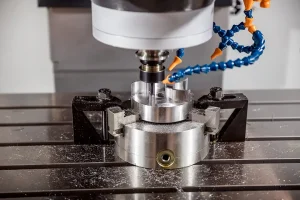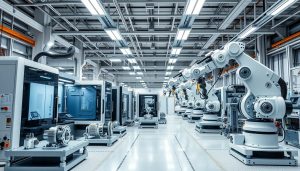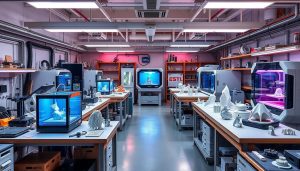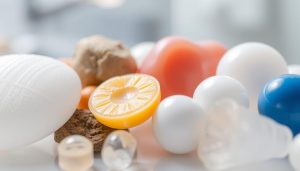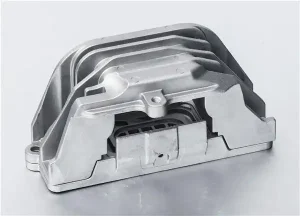Rapid CNC machining is a top choice for precision manufacturing. It’s fast and efficient, making it great for businesses. If you’re new to CNC or want to learn more, this article is for you.
We’ll cover five key questions about rapid CNC machining. Topics include choosing materials and ensuring quality. Our goal is to help you make smart choices for your projects.
What Materials Can Be Used in Rapid CNC Machining?
Choosing the right materials is key in rapid CNC machining. CNC machining is a versatile process that works with many materials. Each material has its own benefits and properties.
Types of Materials Best Suited for CNC Machining
Common materials for CNC machining include:
- Metals like aluminum, stainless steel, titanium, and brass, which offer strength, durability, and precision.
- Plastics such as ABS, nylon, and polycarbonate, which are lightweight, cost-effective, and easy to machine.
- Composites like carbon fiber and fiberglass, which combine the benefits of multiple materials for specific needs.
Considerations When Choosing Materials
When picking materials for CNC machining, several important factors come into play:
- CNC machining materials properties: Hardness, density, thermal conductivity, and machinability are key in choosing a material.
- Material selection based on project needs: The material should match the product’s function, look, and performance.
- Material properties that affect machining, such as tool wear, surface finish, and accuracy.
By carefully considering these factors, manufacturers can pick the right CNC machining materials. This ensures high-quality, precision parts for their projects.
| Material | Advantages | Disadvantages |
|---|---|---|
| Aluminum | Lightweight, affordable, and easy to machine | Lower strength and durability compared to other metals |
| Stainless Steel | Excellent corrosion resistance and high strength | Harder to machine than aluminum and more expensive |
| Nylon | Versatile, durable, and cost-effective | May require specialized machining techniques |
| Carbon Fiber | Extremely strong and lightweight | More complex and expensive manufacturing process |
Cost Factors in Rapid CNC Machining
The cost of CNC machining can change a lot based on different factors. Knowing these factors is key for businesses to keep their CNC projects affordable. Let’s look at what affects the cost of rapid CNC machining.
Factors Affecting the Cost of CNC Machining
Several things can change the cost of CNC machining. Here are some:
- Material Choice: The material used, like aluminum or stainless steel, can greatly change the cost. Some materials cost more than others, and prices can change based on supply and demand.
- Design Complexity: How complex the design is can also affect the cost. Parts with many features or shapes need more tools and programming, making them more expensive.
- Production Volume: How many parts you need can also change the cost. Making more parts at once can be cheaper because you spread out the fixed costs.
- Lead Time and Turnaround: Needing parts fast can cost more. This might mean paying extra for quicker production or using special equipment.
How to Minimize CNC Machining Costs
To make CNC machining cheaper, businesses can try a few things:
- Choose the Right Material: Pick the most affordable material that still meets your needs and quality standards.
- Simplify the Design: Try to make the design simpler. This can cut down on machining time and cost.
- Optimize Production Quantities: Find the best number of parts to make to get the best price. This can help you save money by spreading out costs.
- Leverage Rapid Prototyping: Use quick prototyping, like 3D printing, to test and improve designs before full-scale production. This can help save money and make the final product better.
| Cost Factor | Impact on CNC Machining Costs |
|---|---|
| Material Choice | Using expensive materials, like specialty alloys, can make CNC machining more costly. |
| Design Complexity | Parts with complex designs need more tools and time, which increases the cost. |
| Production Volume | Making more parts at once can be cheaper because you spread out the costs. |
| Lead Time and Turnaround | Need parts fast? It might cost more because you might need to pay for quicker production or use special equipment. |
By knowing these cost factors and using smart strategies, businesses can make the most of their CNC machining projects. This way, they can get the best value for their money.
How Accurate Is Rapid CNC Machining?
Accuracy is key in precision manufacturing. Rapid CNC machining is a leading technology known for its CNC machining accuracy and precision. We’ll look at CNC machining’s capabilities and how it stacks up against traditional methods.
The Precision of Rapid CNC Machining
CNC machining excels in achieving tight tolerance levels. Modern CNC machines can make parts with tolerances as small as ±0.025 mm (±0.001 inches). This precision is vital for industries like aerospace, medical, and automotive.
The precision comes from advanced computer controls, precise tools, and machine calibration. This setup lets CNC machines consistently meet high standards, every time.
Comparing CNC Machining to Traditional Methods
CNC machining beats traditional methods like manual machining or casting in accuracy and precision. Manual machining depends on the operator’s skill, leading to more variability. CNC machines, however, follow programmed instructions with unmatched consistency.
| Metric | CNC Machining | Traditional Manufacturing |
|---|---|---|
| Typical Tolerance | ±0.025 mm (±0.001 inches) | ±0.1 mm (±0.004 inches) |
| Repeatability | Highly Consistent | Variable |
| Surface Finish | Excellent | Good, but can vary |
The table shows CNC machining’s edge over traditional methods in accuracy and precision. CNC machining is the top choice for industries needing the highest precision manufacturing.
What Are the Speed and Turnaround Times for CNC Machining?
Speed and turnaround times are key in rapid CNC machining. Modern CNC tech has cut lead times, helping businesses get parts faster than before.
Typical Lead Times in Rapid CNC Machining
Lead times vary based on part complexity, materials, and volume. Rapid CNC machining leads are often shorter than traditional methods. Small parts can take 3-5 business days, while bigger ones might need 1-2 weeks.
How Fast Can You Get Prototypes?
CNC machining is great for quick prototypes. The right partner can deliver high-quality prototypes in days, not weeks or months. This is crucial for design testing and iteration.
Some businesses use CNC machining production speed for small runs. This way, they can quickly get their products to market.
The fast CNC machining lead times make it a top choice for quick rapid prototyping and production needs.
How Do You Ensure Quality in CNC Machining?
Keeping CNC-machined parts consistent is key for any project’s success. Quality assurance and inspection methods are crucial. They help spot and fix problems early on.
Ensuring Consistent Quality in CNC Parts
Manufacturers use a few key steps to ensure quality in CNC machining:
- Stringent process controls watch over each production step, from picking materials to the final touch.
- Comprehensive operator training makes sure machinists follow quality rules.
- Regular machine calibration and maintenance keeps machines running well and accurately.
How to Verify CNC Machining Quality
Checking CNC-machined parts quality involves several inspection methods and tests:
- Dimensional checks with coordinate measuring machines (CMMs) and other precise tools.
- Looking at surface finish with the eye and profilometry.
- Material tests to check if it meets mechanical and chemical standards.
- Statistical process control (SPC) to keep an eye on and improve production data.
With strong CNC quality control and quality assurance, makers can trust in the consistent quality of their CNC parts. This meets the high standards of today’s market.
Choose Shixinproto for Fast and Reliable CNC Machining Services
Shixinproto is your go-to for CNC machining needs. They are known for fast, reliable, and high-quality services. They serve a wide range of industries.
Why Shixinproto is the Best Choice for Your CNC Projects
Shixinproto’s team is full of skilled CNC machinists and engineers. They have years of experience. This means your projects are in good hands, from prototypes to large production runs.
Shixinproto stands out because of their focus on quality and customer happiness. They use the latest equipment and techniques. Their quality control is strict, ensuring parts are accurate and durable.
Need quick prototypes, small batches, or big production runs? Shixinproto can handle it all. They have the skills and tools to make your CNC projects a success.
FAQ
What Materials Can Be Used in Rapid CNC Machining?
Rapid CNC machining works with many materials. This includes metals like aluminum, stainless steel, and titanium. It also works with plastics like ABS, PEEK, and polycarbonate. The right material depends on the part’s design, needed performance, and how many you need to make.
How Do Cost Factors Affect Rapid CNC Machining?
Several things affect the cost of rapid CNC machining. These include the material, how complex the design is, how many you need, and the precision needed. By thinking about these and working with a good CNC machining service, you can save money without losing quality.
How Accurate Is Rapid CNC Machining?
Rapid CNC machining is very accurate. It can get within ±0.001 to ±0.005 inches, depending on the part. This is often better than traditional methods, making it great for parts that need to fit together perfectly.
What Are the Speed and Turnaround Times for CNC Machining?
Rapid CNC machining is fast. It can take just a few days to a few weeks, depending on the project. For making prototypes or small batches, CNC machining is often quicker than other methods.
How Do You Ensure Quality in CNC Machining?
Ensuring quality in CNC machining involves several steps. This includes controlling the process, using advanced checks, and having strong quality checks. This way, every part meets the quality and precision needed.
